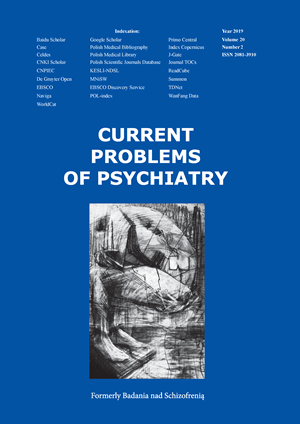Nutritional assessment of omega-3 fatty acids intake in schizophrenia patients group
DOI:
https://doi.org/10.2478/cpp-2019-0008Keywords:
schizophrenia, omega-3 essential unsaturated fatty acids, dietary assessmentAbstract
Introduction: Schizophrenia is a chronic mental disease which significantly affects functioning and quality of life of patients. Lifestyle, including irregular eating habits, is a factor possibly intensifying symptoms of the disease and unwanted effects of pharmacotherapy. Due to positive effect on metabolic parameters demonstrated in numerous studies and participation in structure and functioning of central nervous system, omega-3 essential unsaturated fatty acids (EFAs) are the suggested form of schizophrenia cotheraphy.
Aim: The purpose of this paper was to evaluate EFAs (especially omega-3 family) consumption by individuals with schizophrenia and comparing contents of these acids in the diets of female and male patients.
Method: A study was conducted with the participation of 32 patients, recruited in the Psychiatric Outpatient Department of the Independent Public Clinical Hospital No. 1 in Lublin, with diagnosed schizophrenia. Data concerning the intake of EFAs was acquired in the course of 24-hour diet recall.
Results: Average intake of omega-3 EFAs in the examined population was 2.40 ± 2.85 g, of which only 201.6 ± 501.5 mg was constituted by EPA and DHA acids. The intake of omega-3 EFAs did not differ between men and women groups (p>0.05). Food rations of the 91% responders were characterised with the intake of EPA and DHA acids below the adequate intake level (AI).
Conclusions: Patients suffering from schizophrenia consume insufficient amounts of EPA and DHA acids. Evidence suggests that optimum intake of omega-3 EFAs could bring significant benefits for this group of patients. People suffering from schizophrenia should be attended with the care of a dietician, who will choose optimum strategy for supplying sufficient amount of nutrients in the diet.
References
1. Matheson SL, Shepherd AM, Laurens KR, Carr VJ. A systematic meta-review grading the evidence for non-genetic risk factors and putative antecedents of schizophrenia. Schizophrenia research. 2011;133:133–42.
2. Torrey EF, Bartko JJ, Yolken RH. Toxoplasma gondii and other risk factors for schizophrenia: an update. Schizophrenia bulletin. 2012;38:642–7.
3. Simeone JC, Ward AJ, Rotella P, Collins J, Windisch R. An evaluation of variation in published estimates of schizophrenia prevalence from 1990- 2013: a systematic literature review. BMC psychiatry. 2015;15:193.
4. Rajji TK, Miranda D, Mulsant BH. Cognition, function, and disability in patients with schizophrenia: a review of longitudinal studies. The Canadian Journal of Psychiatry. 2014;59:13–7.
5. Thornicroft G. Physical health disparities and mental illness: the scandal of premature mortality. The British Journal of Psychiatry. 2011;199:441–2.
6. Hjorth P, Medici CR, Juel A, Madsen NJ, Vandborg K, Munk-Jørgensen P. Improving quality of life and physical health in patients with schizophrenia: A 30-month program carried out in a real-life setting. International Journal of Social Psychiatry. 2017;63:287–96.
7. Róg J, Karakuła-Juchnowicz H. Omega – 3 fatty acids in schizophrenia – part I: importance in the pathophysiology of schizophrenia. Current Problems of Psychiatry. 2016;17:198–213.
8. Bozzatello P, Brignolo E, De Grandi E, Bellino S. Supplementation with Omega-3 Fatty Acids in Psychiatric Disorders: A Review of Literature Data. Journal of Clinical Medicine. 2016;5:67.
9. Freeman MP, Hibbeln JR, Wisner KL et al. Omega-3 Fatty Acids: Evidence Basis for Treatment and Future Research in Psychiatry. Fatty Acids. 67 (12): 1954-1967.
10. Mellor JE, Laugharne JDE, Peet M. Omega-3 fatty acid supplementation in schizophrenic patients. Human Psychopharmacology: Clinical and Experimental. 1996;11:39–46.
11. Kunachowicz H, Nadolna I, Przygoda B, Iwanow K. Tabele wartości odżywczej produktów spożywczych. IŻŻ, Warszawa. 1998;434.
12. GUS. Rocznik Statystyczny Rolnictwa 2016. stat.gov.pl. https://stat.gov.pl/obszary-tematyczne/rocznikistatystyczne/roczniki-statystyczne/rocznik-statystycznyrolnictwa-2016,6,10.html. Accessed 9 Jul 2019.
13. Dipasquale S, Pariante CM, Dazzan P, Aguglia E, McGuire P, Mondelli V. The dietary pattern of patients with schizophrenia: a systematic review. Journal of psychiatric research. 2013;47:197–207.
14. Teasdale S, Samaras K, Wade T, Jarman R, Ward P. A review of the nutritional challenges experienced by people living with severe mental illness: a role for dietitians in addressing physical health gaps. Journal of human nutrition and dietetics. 2017;30:545–53
Downloads
Published
Issue
Section
License
Copyright (c) 2019 Authors

This work is licensed under a Creative Commons Attribution-NonCommercial-NoDerivatives 3.0 Unported License.


